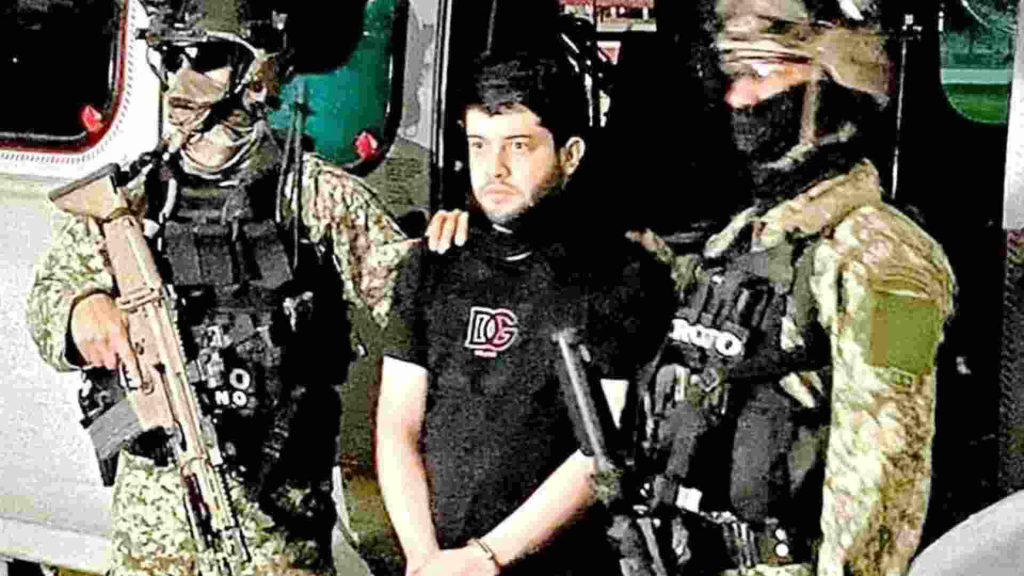
WASHINGTON D.C. – (WBAP/KLIF) – A suspected top level senior Sinaloa cartel assassin is extradited to the United States; released by Mexico to American officials in almost record time. 32-year old Nestor Isidro Perez Salas, known as “El Nini”, is cooling his heels in New York as a court case is pulled together. He’s described by U S Attorney General Merrick Garland as a vicious sicario or “hit-man”, responsible for kidnapping, torture and murder of rivals and witnesses, including the death of a Drug Enforcement Administration confidential source and associated others who threatened the Sinaloa Cartel drug trafficking enterprise, as well as the trafficking of poisonous drugs into the U.S. and around the world, and more recently, human trafficking on a large and growing scale. The former head of international operations for the U.S. Drug Enforcement Administration Mike Vigil describes him as “a complete psychopath”.
The U.S. offered up to $3 million reward for information leading to the arrest of Perez Salas, arrested less than one week after President Biden and Mexican President Lopez Obrador met and pledged to coordinate more closely on fighting drug trafficking, especially that which involves fentanyl. The presidential meeting happened in San Fransisco, California, followed by comments from both presidents, November 17, 2023.
The Justice Department alleges Perez Salas served as the security chief for Joaquin Archivaldo Guzman Loera, or, “El Chapo”, now jailed at ADX Florence Supermax prison in Colorado, and then, leading a security team known as the “Ninis”; described in court documents as a particularly violent group of personnel for the “Chapitos”, a faction of the Sinaloa Cartel now believed to be run by the sons of “El Chapo”.
Authorities say Perez Salas was involved in the torture of a Mexican federal agent in 2017. It’s alleged the agent was tortured using a corkscrew in his muscles, and after repeated withdrawals, placing hot chili peppers into the wounds to inflict higher levels of pain. Federal officials say some of the Sinaloa Cartels’ victims were fed alive or dead to tigers kept on a “Chapitos”-owned ranch as pets. Further, they assert the group regularly used military grade firearms including rocket launchers and machine guns to kidnap, torture and kill anyone opposed to the “Chapo” and “Chapitos” faction of the Sinaloa Cartel.
Federal officials say Perez Salas will be charged in the U.S. with importation of fentanyl, cocaine and methamphetimines, firearms offenses and conspiracy to obstruct justice through murder and money laundering. American officials say the arrest and extradition of Perez Salas could lead to a change in the structure of the Sinaloa Cartel, expected to lead to a fight for succession and a wave of internal violence.
The Sinaloa Cartel is currently engaged in a growing and violent turf war with the Jalisco New Generation Cartel, or CJNG, based in Jalisco. Illicit operations by both the Sinaloa and CJNG cartels are considered deeply embedded nationwide in the United States. Both cartels are believed responsible for a years-long campaign of terror throughout Mexico with beheadings and dismembering of rival cartel members at all levels, often videotaped and placed on the Internet. Ongoing discovery of mass graves throughout Mexico, including the remains of children and babies, often migrants, are attributed to the violent conflicts between the Sinaloa, CJNG, and other Mexican cartels. Both the Sinaloa and CJNG cartels, in addition to others, are blamed for ongoing and numerous assassinations of political candidates, office-holders, policing and judicial officials that do not, in some way, work with them in exchange for monetary bribes.
The U.S. currently offers a $10 million reward for the assumed leader of the CNJG, Nemesio Oseguera Ramos, or “El Mencho”. It offers several rewards for operators and high level players in the “Chapitos” arm of the Sinaloa Cartel, including $10 million for information leading to the arrest and or conviction of “El Chapo” sons Ivan Archivaldo Guzman Salazar, and Jesus Alredo Guzman Salazar. It also offers up to $15 million for the man considered head of a group believed to be running operations parallel to the Sinaloa Cartel’s “Chapitos” faction, Ismael Mario Zambada-Garcia, or “El Mayo”, and rewards for many suspects considered aligned with these individuals.
The extradition of Perez Salas to the United States is considered one of the most high-profile under Mexico’s current, and outgoing President Lopez-Obrador. Mexico’s next presidential election will be held Sunday, June 2, 2024. Polls indicate the likely successor to Lopez-Obrador will be ruling party candidate Claudia Scheinbaum, former Mayor of Mexico City. The survey company Parametria shows Sheinbaum with the “MORENA”, or National Regeneration Movement party, with 50% support, ahead of Xochitl Galvez, candidate for an opposition allliance of three parties, with 34%. An earlier poll gave third presidential contender Jorge Alvarez Maynez of the opposition center-left Citizens’ Movement with 13% in the month of May.
The Lopez Obrador administration has been widely criticized for it’s 2018 political campaign’s security and strategy policy of “hugs, not bullets” in dealing with organized crime cartels. As cartel related violence grows across Mexico, critics say the policy has amounted to a presidential “hugs for thugs”. While campaigning at that time, Lopez Obrador proposed amnesty for those involved with drug cartels and organized crime, blaming the country’s growing crime phenomenon on poverty and corruption. Mexican cartels, drug and human trafficking and deadly violence against citizens in Mexico grew severalfold, as did the American fentanyl overdose crisis, during the Lopez Obrador term. American fatalities related to fentanyl consumption grew from nearly 8,800 deaths in 2015 to nearly 108,000 in 2023.
Mexico’s official numbers of “forcibly disappeared” missing people, many believed executed and unlikely to be found, officially grew to almost 112,000 since record keeping began in 1962. The United Nations Committee on Enforced Disappearances suggests the more accurate number is likely much higher, as many families do not report kidnappings or disappearances, understanding reporting the crimes or disappearances could increase their chances for the same fate. Further, the U.N. says Mexico’s national register still lacks a “clear and transparent methodology” or disaggregated data concerning socioeconomic and migrant status, gender identity and sexual orientation demographics. In a report, the U.N. said Mexican officials were guilty of “revictimizing” some grieving relatives in several ways, including accusing families of hiding abducted loved ones.
(Copyright, All Rights Reserved, WBAP/KLIF 2023)






